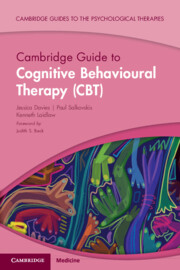
-
Select format
-
- Publisher:
- Cambridge University Press
- Publication date:
- November 2025
- September 2025
- ISBN:
- 9781009090940
- 9781009088350
- Dimensions:
- Weight & Pages:
- Dimensions:
- (234 x 156 mm)
- Weight & Pages:
- 0.62kg, 408 Pages
You may already have access via personal or institutional login
Book description
This book provides a concise and up-to-date guide to Cognitive Behavioural Therapy (CBT), from the history and supporting theory, through to the most recent empirical evidence and practical aspects of delivery. Starting with an overview of the structure of CBT, practitioners can utilise this detailed guide to deliver therapy in clinical practice, whilst its coverage of various adaptations of CBT, such as group therapy and working with older adults, allow therapy to be tailored to different settings with different timeframes attached. Covering all the major CBT protocols necessary to work with a wide range of common mental health conditions. A comprehensive resource for a wide range of practitioners providing practical approaches, goals, and strategies to manage mental health problems using CBT. Part of the Cambridge Guides to the Psychological Therapies series, offering all the latest scientifically rigorous, and practical information on a range of key, evidence-based psychological interventions for clinicians.
Reviews
‘This guide is a must-have for any mental health professional who uses cognitive behavioural therapy in their practice. Written by internationally regarded CBT researchers, teachers and clinicians, it not only provides the reader with concisely written instruction on how to deliver CBT for a variety of mental health conditions, but also neatly links such guidance to the powerful theories and evidence that underpin the application of CBT. A wide range of disorders is included, each with multiple CBT models expertly summarised and contrasted. Other chapters consider the application of CBT to different populations and settings. Both those new to CBT and expert practitioners will find this volume an essential text that supports their practice for years to come.'
Richard Meiser-Stedman - Department of Clinical Psychology and Psychological Therapies, Norwich Medical School, University of East Anglia, UK
‘A thoroughly enjoyable book, written by notable thinkers and experienced psychotherapists with a long history of working with populations across different age ranges. It clearly and robustly reviews the theoretical, methodological and practical arguments that make CBT an evidence-based practice for adults, including older adults, dealing with issues such as depression or anxiety. It has strong applied value, as it presents the therapeutic process in a highly practical way, with excellent examples illustrating therapy goals, techniques and structure. Across its chapters, the book covers a wide range of disorders as well as case examples of therapy applied in various contexts and populations – including children, older adults and caregivers of family members with dementia, couples, and both group and computer-based interventions. I recommend it both for students or early-career therapists and for professionals interested in strengthening their knowledge and practical resources.'
Andrés Losada Baltar - Professor of Clinical Psychology, Rey Juan Carlos University, Spain
‘This book offers a comprehensive and authoritative account of CBT, tracing its historical and scientific foundations while demonstrating its relevance across diverse mental health conditions, practice settings and populations. It is monumental in its scope by showcasing CBT as a rich and versatile treatment that is effective for numerous psychological disorders, inpatient and outpatient settings, older adults, carers, children and young people. It presents CBT as a structured, goal-oriented, and collaborative therapy, characterised by its creativity and responsiveness to client needs. The text is enriched by case examples, treatment protocols and therapist-client scripts that bring interventions to life and demonstrate their practical application. With its conversational writing style, the book succeeds in making complex ideas understandable without oversimplification. This book is invaluable for both emerging and experienced practitioners seeking to deepen their understanding of CBT and enhance their therapeutic practice.'
Sunil Bhar - Ph.D., Swinburne University of Technology, Melbourne, Australia
Contents
Metrics
Full text views
Full text views help Loading metrics...
Loading metrics...
* Views captured on Cambridge Core between #date#. This data will be updated every 24 hours.
Usage data cannot currently be displayed.
Accessibility standard: Unknown
Why this information is here
This section outlines the accessibility features of this content - including support for screen readers, full keyboard navigation and high-contrast display options. This may not be relevant for you.
Accessibility Information
Accessibility compliance for the PDF of this book is currently unknown and may be updated in the future.

